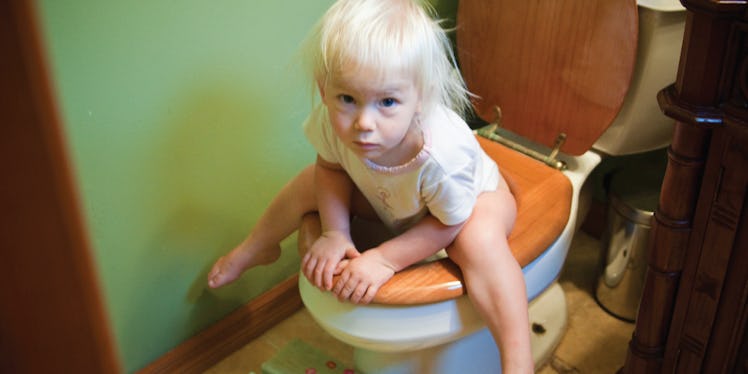When To Start Potty Training Your Toddler
Don't sit here broken-hearted.

Figuring out when to start potty training is almost as angst-inducing as actually starting to potty train. Are you going to start too early and forever give them a complex for which they will be sending you therapy bills forever and ever? Or will you start them too late and forever give them a complex … for which … Oh. Crap … Surprise! There aren’t any easy answers! But it’s time to poop or get off the pot. Here’re some tips for potty training to help your kid get acquainted with their future porcelain pal.
There are arguments for and against toilet training at every age, from as early as 3 months. Seriously! Plenty of cultures across the globe have been teaching ’em super young for a very long time. Hell, the Vietnamese are done with potty training by 9 months.
Their basic technique involves creating a kind of pavlovian response, where the parent observes signs of impending elimination then allows the kid to let loose in an appropriate place, like your neighbor’s azalea beds. During elimination, the parent makes a sound that the kid then learns to listen for before doing their thing. Clearly, this technique hasn’t been widely adopted America or you’d see kids wetting themselves every time their mom got a new text.
Previous generations of American kids were usually out of diapers by 18 months, but these days it’s perfectly normal for kids to wear diapers well into their second or even third year. Totally up to you, but here’s why earlier might be better:
- Saves you money. Bet you had no idea diapers were so expensive.
- Your family creates less waste. No pun intended. For once.
- Junior avoids nastiness. Like diaper rash, yeast infections, rotavirus, urinary tract infections, and giardia (the parasite, not giardiniera, the delicious Chicago-style spicy relish that, when referenced beside potty training, leads to symptoms associated with giardia).
Again, wait if you want. There haven’t been a ton of studies done to prove you should, but by most experts’ accounts it’s fine. Probably. There does, however, seem to exist a potty training black hole between ages one and 2. At that age, kids are way more interested in mobility than in doing anything for you, so you can try to start at around a year, but don’t push it if the kid isn’t interested.
You’d be better off spending that time prepping your kid for the eventuality of potty training, starting by acknowledging that any modesty you might have once had is dead and buried. Actually, getting your kid psyched for the start of later potty training can be pretty fun — you get to talk about poop, like all the time! Bombs away!
Let Them Watch
For real. It’ll help them see the whole potty playbook and know it’s nothing scary. Try to avoid your usual iPad browsing, unless you’re browsing about how to talk to your kid about pooping. Poopception! Also, let them flush
Talk About Who Poops And Why
Talk about why the cat poops. And why the dog poops. And why grandpa poops. Talk about pee. Do it all over again. Have them talk to you about when they have to go and when they’ve gone in their diaper. Explain why it’s important for you to know, so they don’t get itchy and uncomfortable
Potty Role Play With A Training Bowl
Now that they’ve seen everyone else go, they should start practicing. Dry runs, as it were. Make a game out of it for a couple weeks before you start the real thing.
Make Undies ‘Fundies’
Help them appreciate underwear and let them pick them out. Having Elsa on your butt is a great reward, but only if you let it go (LET IT GO!) at the right time and place.
Pass The Fiber
When the time finally comes, at least make it easy for your kid to do the deed. There’s nothing worse than sitting there broken hearted because you wanted to poop and … you get it.
People who have done this way more than you have various checklists of behaviors to watch for to ascertain if your kid is ready to start using the crapper — things like going at least 2 hours between urinating, recognizable facial expressions that signify a need to go, and the ability to walk to the bathroom when they’re ready.
A lot of these signs are actually teachable, so you can speed up the process by talking to your kid about what they should do, familiarizing them with their equipment and — once you start training — praising them when they use the potty correctly. It might feel a little weird in the moment, but not as weird as having a 10-year-old in a diaper.
This article was originally published on